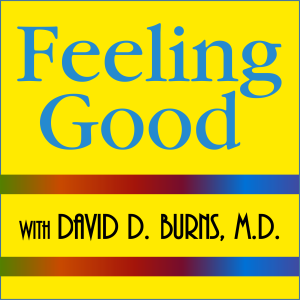
Feeling Good Podcast | TEAM-CBT - The New Mood Therapy
Health & Fitness:Mental Health

242: Professor Yehuda’s TEAM-CBT Israeli Initiative!
 2021-05-17
2021-05-17
Today’s podcast is the latest in a series Rhonda has created featuring people who are doing interesting and creative things with TEAM-CBT. In today’s episode, we feature Yehuda Bar-Shalom, D.H.L, TEAM CBT level 4 trainer and therapist, who will teach us all about the use of TEAM in the school system.
Yehuda, who is an associate professor appointed by the Council of higher education in Israel, is the first person we know to teach TEAM to school counselors in a practical way. (We also refer you to our podcast episode 152 where we interviewed Amy Spector, MFT, who is a TEAM therapist providing TEAM therapy to “at-risk” teen-agers at a high school in the San Francisco Bay Area.)
Yehuda is an educator, psychotherapist and researcher. He has served as president of Hebraica University in Mexico City, the only Jewish University in Latin America which is open to students of all religious faiths. When he became the president of Hebraica University, he adapted the psychology and wellbeing department so that it became a training program for TEAM therapists. When he returned to Israel in 2020, Yehuda’s former student Victoria Chicurel, and several others, continued the Mexico TEAM training program.
Yehuda has authored seven books and almost 70 academic articles on education and society, with a focus on Jewish education, social entrepreneurship and consulting in psycho-educational settings, mostly from a CBT perspective. He has been the Vice President of the David Yellin College in Jerusalem, and the Dean of Education at the Ono Academic College. His book, Educating Israel: Educational Entrepreneurship in Israel’s Multicultural Society was published in 2006. Yehuda is married to Amira Bar Shalom, and has three children.
Yehuda, who in his professional life is both a therapist, educator, and researcher, earned his doctorate in education in 1997, conducting research on applying Bion’s theory in group work with adolescents. When he was teaching school counselors, he realized he wanted to become a counselor, so, 20 years after earning his research doctorate, he went back to school and earned a Master’s degree in school counseling, and later another Master degree in the treatment of addictions. He also studied for a two-year certificate in cognitive behavioral therapy at the Psagot Institute, where he met Maor Katz, MD, Director of the Feeling Good Institute, and one of the Psagot instructors who taught TEAM therapy.
Yehuda also learned about TEAM therapy by listening to the Feeling Good Podcasts. When he started listening, he thought TEAM therapy was “like a miracle.”
Yehuda then attended several of David’s TEAM training workshops, as well as on-line trainings sponsored by the Feeling Good Institute (FGI). He has also studied one-on-one with Level 5 TEAM therapist, Daniel Minte.
Yehuda currently teaches at a master’s level training program for school counselors at the Ramat Gan College in Israel. He is committed to teaching TEAM to school counselors for many reasons. One is that using TEAM provides school counselors with an immediate way to create a fast connection to students. In addition, TEAM can more quickly help students who are struggling with their moods, behaviors, relationships, or habits and addictions.
Yehuda emphasizes the importance of T = Testing for the school counselors, and teaches them how it helps create empathy. For example, the school counselor might say this to a new student, “Oh, I see your score on anger is such and such. Tell me about that.”
Yehuda explained that school counselors are like primary care physicians. They have the immediate pulse on the student’s needs and feelings. He is training the school counselors to speak with their students using the Five Secrets of Effective Communication. He also shows the counselors how to teach the Five Secrets, so their students can use this tool in their lives.
He gave an example of how a school counselor might use the Disarming Technique when interacting with a child who feels angry and wants to escape. The counselor might say, “Wow, I can see that you’re feeling really angry about being sent to me for counseling and that you want to escape! I want to escape, too!” Then the child feels understood and opens up.
Yehuda is also teaching the school counselors how to identify their own distorted negative thoughts, and how to positively reframe and challenge them. Once the counselors learn these skills for themselves, they can teach them to their students so that the students can learn to challenge their own distorted thoughts.
The school counselors are also learning the use of paradox, so prominent in TEAM therapy, in order to help them understand their students’ motivations about why they feel and act the way they do, and how their understanding of their students’ motivations can lead to the change.
The school counselors Yehuda trains are often quite skeptical and don’t believe him or David, which is understandable. He encourages them to maintain their skepticism but do an experiment and try these tools so they can see what happens. They are often pleasantly surprised by the results.
Yehuda describes the counselors he trains as humble, down-to-earth, and hungry to master new techniques that can boost their effectiveness when working with troubled students.
If you want to learn more about Yehuda’s work, visit his website at:
https://sites.google.com/view/yehudabarshalom
Rhonda and David
More Episodes
 2022-12-05
2022-12-05
 2022-11-28
2022-11-28
 2022-10-31
2022-10-31
 2022-10-10
2022-10-10
 2022-10-03
2022-10-03
 2022-09-26
2022-09-26
 2022-09-19
2022-09-19
 2022-09-05
2022-09-05
 2022-08-29
2022-08-29
 2022-08-01
2022-08-01
Create your
podcast in
minutes
- Full-featured podcast site
- Unlimited storage and bandwidth
- Comprehensive podcast stats
- Distribute to Apple Podcasts, Spotify, and more
- Make money with your podcast
It is Free
- Privacy Policy
- Cookie Policy
- Terms of Use
- Consent Preferences
- Copyright © 2015-2024 Podbean.com


